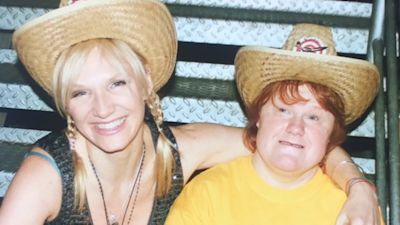BBC Radio 2 DJ Jo Whiley receives Covid vaccine offer before sister with learning disabilities and diabetes

DJ Jo Whiley said she cannot understand why she was offered the Covid vaccine before her younger sister, who has learning difficulties and diabetes.
Whiley said she is "living through a nightmare" after her sister Frances, 53, suffered a coronavirus outbreak at her care home and the effect on her sister's mental health has been “quite extreme”.
The BBC Radio 2 DJ said if she could, she would give up her vaccine “in a heartbeat” to Frances, who has the rare Cri du Chat genetic syndrome.
Appearing on BBC Radio 4's Today programme, Whiley said of the coronavirus outbreak at her sister's care home: “Oh my God, I can’t tell you how frustrating it is and how horrendous it is.
“It is the stuff of nightmares at the moment. I feel like I am living through a nightmare.
“All weekend it has been awful – really, really difficult. It has been hard for my parents, it has been hard for everyone in the care home, and it continues.
“And then, ironically, I got a message to say I was due to have my vaccine before my sister who has got learning difficulties and underlying health conditions. Go figure.”
Since the interview, Frances has tested positive for the virus.
"Late last night I got a call to say that Frances, my sister, had tested positive & has COVID," Whiley wrote.
"Our worst fears realised after keeping her safe for a year & with a vaccine so close."Frances has been unable to see her parents since the outbreak and become “very distressed”.
Whiley said she has, for the first time, refused to take calls from family members.
The 55-year-old DJ has been campaigning for her sister to be prioritised for the jab and said people with learning disabilities are often neglected.
As more than 15 million people in the UK have received their first dose of a Covid vaccine, the vaccine rollout is opening up to more priority groups. The government initially targeted the top four priority groups, including people over the age of 70 and health and care staff.
Whiley said she does not know why has been called for her injection, but suggested it may be because she is classed as a carer for her sister.
“I fail to understand, to be honest with you,” she said.
“Myself, my parents and the home have done everything we can to try and facilitate the vaccine coming in to the people who need it the most.
“She is in tier six but she also has quite bad diabetes, which in my understanding puts her in tier four because she has an underlying health condition, so I would have thought that she would have been vaccinated, but that hasn’t happened.
“And I suppose what I am doing is just wanting to speak up for people like Frances, people who live in her care home, who have been overlooked, because this happens so often.
“People with learning difficulties are neglected. They haven’t got a voice, they haven’t got anybody there. Just badgering everybody saying ‘What about me? Help me out here’.”
She added: “And I would give up my vaccine in a heartbeat if I could for my sister and any of the residents in her house to have their vaccine. It just does not feel right.”
Who is getting the vaccine next? Who is 'clinically vulnerable'?
How many people have been vaccinated in the UK and when will I get it?
Edel Harris, chief executive of the learning disability charity Mencap, said: “It’s encouraging that the government has reached the milestone of vaccinating the top four priority groups – but too many people with a learning disability are still waiting, despite being at a high risk of dying from the virus.
“People with a learning disability are six times more likely to die from Covid-19 than the rest of the population yet those with a mild or moderate learning disability aren’t prioritised at all.
"We urge the government to include everyone with a learning disability in group six urgently – it is not too late.
“It’s unacceptable that within a group of people hit so hard by the pandemic, and who even before Covid died on average over 20 years younger than the general population, many are left feeling scared and wondering why they have been left out."
Listen to our podcast - Coronavirus: What you need to know: